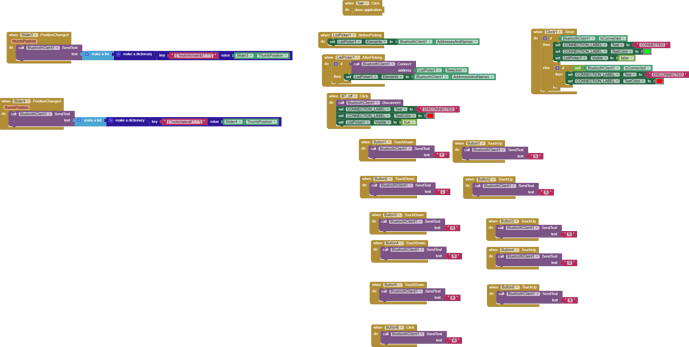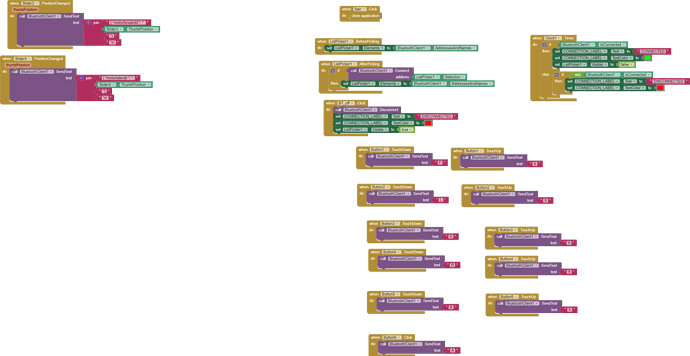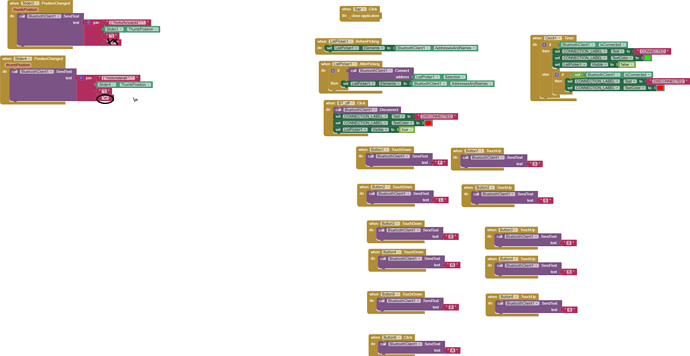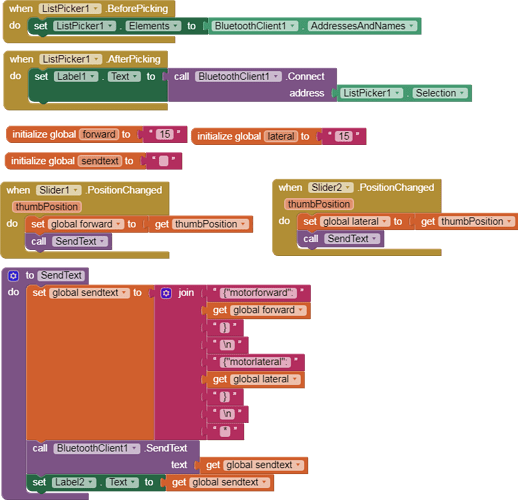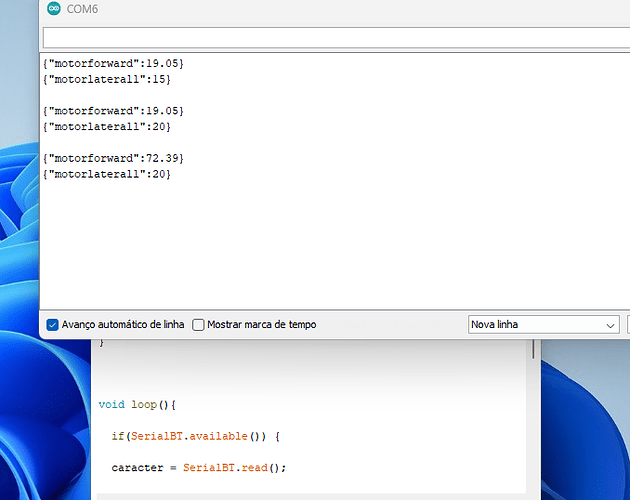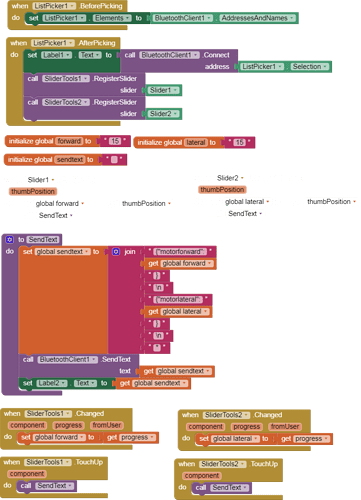my problem is create a json and send to serial monitor and then deserealise
blocks below:
You are overthinking the JSON building part.
Just use a 3 way text JOIN sandwich, with your thumb position in the middle:
- {"motorforward":
- Slider1.ThumbPosition
- }
Feed the JOIN directly into the BlueTooth.SendText block.
You might need to add a '\n' afterwards to signal end of message.
To get extra JOIN sockets, use the blue mutator button.
i hope i did right this time now i want to receive this json i mean the entire string a deserealise but inside the serial i receive one at time the arduino code below ,can you help me me that
/*
Project: ESP32 Bluetooth Mobile Robot
*/
#include "BluetoothSerial.h"
#include "ArduinoJson.h"
BluetoothSerial SerialBT;
char receivedChar;// received value will be stored as CHAR in this variable
String DATA;
String myFloat;
float motorlaterall;
float motorforwardd;
const int pinEnA = 2;
const int pinIn1 = 0;
const int pinIn2 = 4;
const int pinEnB = 18;
const int pinIn3 = 22;
const int pinIn4 = 23;
#define PWM_FREQUENCY 1000
#define PWM_RESOLUTION 8 // Setting the resolution to 8Bits, gives you a duty cycle range [0 – 255].
#define PWM_CHANNEL 0
void setup() {
Serial.begin(9600);
SerialBT.begin("ESP32_Technical_Alexandre"); //You can change your Bluetooth device name
pinMode(pinEnA,OUTPUT);
pinMode(pinEnB,OUTPUT);
pinMode(pinIn1,OUTPUT);
pinMode(pinIn2,OUTPUT);
pinMode(pinIn3,OUTPUT);
pinMode(pinIn4,OUTPUT);
//Decide on the PWM channel that you’re going to use
//configure this PWM Channel with the selected frequency & resolution using this function.
ledcSetup(PWM_CHANNEL, PWM_FREQUENCY, PWM_RESOLUTION);
//Decide on the GPIO pin to route this PWM Ch signal to.
//Assign that PWM Ch to the selected GPIO pin
ledcAttachPin(pinEnA,PWM_CHANNEL);
ledcAttachPin(pinEnB,PWM_CHANNEL);
//now you can control this PWM pin by changing the duty cycle
//ledcAttachPin(pin,duty cycle)
}
//////////////////////////////////////////////////
// WHEELING FUNCTION
//////////////////////////////////////////////////
void forward(){
Serial.println("Moving forward");
digitalWrite(pinIn1, HIGH);
digitalWrite(pinIn2, LOW);
digitalWrite(pinIn3, HIGH);
digitalWrite(pinIn4, LOW);
}
void right(){
Serial.println("Moving right");
digitalWrite(pinIn1, LOW);
digitalWrite(pinIn2, HIGH);
digitalWrite(pinIn3, HIGH);
digitalWrite(pinIn4, LOW);
}
void left(){
Serial.println("Moving left");
digitalWrite(pinIn1, HIGH);
digitalWrite(pinIn2, LOW);
digitalWrite(pinIn3, LOW);
digitalWrite(pinIn4, HIGH);
}
void backwards(){
Serial.println("Moving backwards");
digitalWrite(pinIn1, LOW);
digitalWrite(pinIn2, HIGH);
digitalWrite(pinIn3, LOW);
digitalWrite(pinIn4, HIGH);
}
void STOP(){
Serial.println("STOP");
digitalWrite(pinIn1, LOW);
digitalWrite(pinIn2, LOW);
digitalWrite(pinIn3, LOW);
digitalWrite(pinIn4, LOW);
}
void control(float forward,float lateral){
float wheelL, wheelR, l = 0.13, r = 0.03;
wheelR = ((forward / r) + (lateral * l) / (2 * r)) * 60;
wheelL = ((forward / r) - (lateral * l) / (2 * r)) * 60;
Serial.print("Roda Direita:");
Serial.println(wheelR);
Serial.print("Roda Esquerda:");
Serial.println(wheelL);
if (wheelR >= 0) {
ledcWrite(PWM_CHANNEL, wheelR);
}
else {
ledcWrite(PWM_CHANNEL, abs(wheelR));
}
if (wheelL >= 0) {
ledcWrite(PWM_CHANNEL, wheelL);
}
else {
ledcWrite(PWM_CHANNEL, abs(wheelL));
}
}
void loop() {
float motorforward ;
float motorlateral;
String ch="";
if (Serial.available()) {
SerialBT.write(Serial.read());
}
if (SerialBT.available()) {
DATA =(String)SerialBT.read()
// receivedChar = (char)SerialBT.read();
/*
while( (ch = (char)SerialBT.read()) != '\0'){
receivedChar +=ch;
}
*/
ch.concat(DATA);
Serial.print ("Received:");//print on serial monitor
Serial.println(ch);//print on serial monitor
//Serial.print ("Received:");//print on serial monitor
// Serial.println(receivedChar);//print on serial monitor
//////////////////////////////////////////////////
// json document
////////////////////////////////////////////////
/*
StaticJsonDocument <800> doc;
const char * json = DATA.c_str();
DeserializationError error = deserializeJson(doc, json);
if (error) {
Serial.print(F("deserializeJson() failed: "));
Serial.println(error.f_str());
return;
}
long motorforwardd = doc["motorforwardd"];
long motorlaterall = doc["motorlaterall"];
Serial.println(motorforwardd);
Serial.println(motorlaterall);
*/
if(receivedChar == 'F')
{
forward() ;
motorforward=motorforward;
motorlateral=0 ;
control( motorforward,motorlateral);
}
if(receivedChar == 'R')
{
right();
motorforward=0;
motorlateral=-motorlateral;
control(motorforward, motorlateral);
}
if(receivedChar == 'L')
{
left() ;
motorforward=0;
motorlateral=motorlaterall;
control( motorforward,motorlateral);
}
if(receivedChar == 'B')
{
backwards();
motorforward= -motorforwardd;
motorlateral=0;
control( motorforward, motorlateral);
}
if(receivedChar == 'S')
{
motorforward=0;
motorlateral=0;
control(motorforward,motorlateral);
}
}
delay(20);
}
The quotes around your \n characters in your slider events are counterproductive.
Remove them.
Regarding how to parse incoming JSON on an IOT device, I defer to those with more experience than me.
Create a small app to send a simple text to the ESP32, and study the information obtained in the Serial Monitor.
About the Slider, I think this extension is better, since the Slider component continuously sends information by BT while sliding and that can cause an error.
thanks ill wait i did what you,ve said
i obtain one at a time { then " and so on
I commented in my previous message that it is best to make a small program to study its operation, I also commented that Slider is not a good option to send information, unless you use it with a Clock.
Here is a small example for you to study how to send information by BT.
#include "BluetoothSerial.h"
BluetoothSerial SerialBT;
char caracter;
String palabra;
void setup(){
Serial.begin(9600);
SerialBT.begin("ESP32test");
}
void loop(){
if(SerialBT.available()) {
caracter = SerialBT.read();
palabra = palabra + caracter;
if(caracter == '*') {
palabra = palabra.substring(0, palabra.length() - 1); // Quita último caracter *
Serial.println(palabra);
palabra = "";
}
delay(100);
} // =>Fin del available
}
now ill try to adapt to my esp32 car to change speed
Try the Slider extension, as I mentioned in the previous message, the information is sent when you TouchUp Slider.
borr_bt_json.aia (12.4 KB)
thanks for helping ill now try to finish the project and send my results later
hello again i hav this new blocks i want to combine de joystick angle with lateral and foreward ,i mwan whenever the angle is negative lateral or forward follow the same parameter
the blocks below
I don't quite understand what you are looking for.
You may want to Send Text the x,y values of the joystick, so in the joystcik.TouchUp block, let
forward = x
lateral = y
SendText
yes i do want to do that the result must be according to the angle of the joystick if i drag towards negative axis i should get the result to my json forward x and lateral y but i dont see how can i do it by using the joystick
This topic was automatically closed 7 days after the last reply. New replies are no longer allowed.
